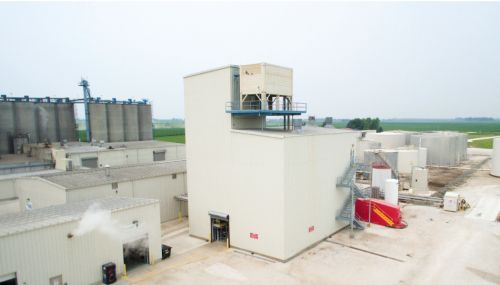All
NYC Will Move to B5 Next Year and Then to B20
by John MacKenna and Sam Diamond
New York City is increasing the biodiesel blend rate in Bioheat® Fuel as an integral part of its aggressive greenhouse gas reduction strategy.
The New York City Council last month overwhelmingly approved a new law that changes the city’s heating oil standard to B5 Bioheat on October 1, 2017, and implements a series of blend increases that culminate in a B20 standard in 2034. Mayor Bill De Blasio signed the local law, known as Intro. 642, into law on October 18.
The New York Oil Heating Association (NYOHA) strongly supports the transition to higher Bioheat blends, which was proposed and shepherded by City Council Member Costa Constantinides, chairman of the Council’s Committee on Environmental Protection.
New York City has had a Bioheat fuel standard since 2012 that mandates the use of B2 Bioheat in place of traditional petroleum heating oil. Heating oil in the City is also limited to 15 parts per million (ppm) of sulfur, making New York City’s heating oil the cleanest in the world. The 15ppm sulfur standard is in effect throughout New York State.
NYOHA CEO Rocco Lacertosa said member companies will benefit from the increase in biodiesel blending. “This measure enables us to have a much cleaner product than before,” he said. “It makes us as clean as natural gas or cleaner and helps members keep more of their customers on oil equipment. The fuel will burn cleaner, and that will help customers gain greater efficiency and reduce the service requirements, which is better for everyone’s bottom line.
”Consumers are looking for cleaner burning, affordable fuels, and this bill helps our industry meet that demand. It also enables us to better compete with alternative fuels. This will keep the hardworking men and women in our industry working for many decades into the future.”
Lacertosa pointed out that Bioheat provides enormous carbon savings and will help the City achieve its goal of reducing greenhouse gas emissions by 80 percent by 2050. “This benefits the families who live and work in the five boroughs of New York City. Our members are helping to improve air quality, and New York City has the cleanest heating oil in the country,” he said.
The move to a combination of ultra low sulfur heating oil and Biodiesel (now referred to as Bioheat® Fuel) has already improved heating oil’s image in New York City and made NYOHA an important partner in the campaign to reduce greenhouse gas emissions, according to the CEO. “Where we were thought of as being a dirty fuel, we are now seen as modern, clean and green. By embracing higher Bioheat® blends, we are actively participating in the fight against climate change,” he said.
The phase-in will start with a B5 Blend in October of 2017 and then scale up to 20 percent biodiesel over the next two decades, according to Lacertosa.
By 2020, the Administration must consult with representatives of the heating oil industry, the biodiesel industry, heating oil equipment manufacturers, and building owners and managers to conduct a survey identifying any commonly used heating oil equipment that might have a compatibility issue with the higher-level biodiesel blends and to make recommendations with respect to any such issues identified.
Ambitious Goals
At the bill signing, De Blasio said New York City “cannot afford to accept the way things are. We must continue to move toward renewable fuels and away from fossil fuels. We’ve already prohibited New York City from use of the dirtiest heating oils, and we have set very clearly and adamantly our goals of reducing greenhouse gas emissions by 80 percent by the year 2050, and [to] have the cleanest air of any large American city by 2030. By requiring that we use heating oil with more biodiesel, this bill will help us to achieve those goals and combat the effects of climate change.”
Constantides also spoke during the signing ceremony. “Expanded use of biofuel in our home heating oil will reduce pollution, upgrade our air quality, and improve our public health,” he said. “Biodiesel can emit up to 90 percent fewer greenhouse gases and up to 10 times less particulate matter. The increase from just 2 to 5 percent is equivalent to taking 45,000 cars off the road. Increasing to a 20 percent blend is the equivalent of taking 175,000 cars off the road.”
“Biodiesel is also cost-effective,” he added. “Its cost has been historically the same or cheaper. Also, our biofuel comes predominantly from used cooking grease that’s recycled from our restaurants across the city, and from the waste products of soybean crops rather than crops grown specifically for that purpose. Restaurants can sell their used cooking oil grease to grease collectors that can turn that into biofuel instead of sending money to dispose of it.
“Since the original biodiesel bill was passed four years ago, a new green industry has sprouted up, and that industry will continue to grow green jobs here in New York City for years to come. One of the main goals of OneNYC was to have the cleanest air in the country, and this legislation will go a long way towards getting that done.”
Environmentalists Lend Support
In an exclusive interview with Oil & Energy, Constantinides said the City Council’s 47-3 vote in favor of Intro. 642 was the fruit of great cooperation between the City Council, De Blasio’s staff, NYOHA and several environmental groups who spoke in favor of the bill.
“We have been able to have meaningful conversations relating to what our goals are,” he said. New York City is pursuing a broad-based transition to less carbon-intensive energy sources, which include solar, wind and biodiesel. “Seventy percent of our emissions come from buildings. We know we want to have green buildings and to burn less petroleum. We know what our motivation is, and we are able to stand up to the lobbying by the American Petroleum Institute.”
The support of environmental groups has been very encouraging, according to Constantinides. The League of Conservation Voters (CLV), the Environmental Defense Fund (EDF) and Empire Clean Cities all backed Intro. 642. CLV uses a scorecard to evaluate the environmental record of City Council members, and the 2016 version features Intro. 642 as a pro-environment measure, he said.
“New York City is the largest city in the world to take on the job of reducing greenhouse gas emissions 80 percent by 2050, and this bill is an important part of that,” he said. “I hope other jurisdictions follow our lead. This is good policy.”
Scott Hedderich, Director of Corporate Affairs for Renewable Energy Group, also spoke at the signing ceremony. “This is a terrific bill, and it has been a long time coming. While we’re based in the Midwest, we’re actually the largest consumer of used cooking oil coming out of the New York-New Jersey Metropolitan Area. This is a terrific measure that will help improve not just the economy for New Yorkers, but the lives and health and well-being as well.”
Daniel Falcone, speaking on behalf of Approved Oil and Soundview Energy Group, said New York is a leader in lowering the carbon intensity of heating oil. “We have the cleanest heating oil in the entire country right here in New York City. We have a fuel now that can burn cleaner than natural gas. I want to take a few seconds out to thank Rocco Lacertosa of the New York Oil Heating Association [for] his leadership, commitment to Bioheat and biodiesel, keeping it in the forefront of our membership, and pushing our industry to include the fuel.”
Donnell Rehagen, Chief Operating Officer of the National Biodiesel Board, also issued a statement praising the City for passing Intro. 642. “New York City is once again setting an example for the rest of the Northeast to follow by ensuring consumers are provided with the nation’s cleanest heating oil. Not only does biodiesel dramatically reduce carbon emissions, it reduces other harmful pollutants as well as smog, making New York’s air healthier to breathe.”
Related Posts
 Why Quality Matters in Your Biofuel Blends
Why Quality Matters in Your Biofuel Blends
Posted on June 25, 2025
 Incorporating Higher Blends of Biofuels
Incorporating Higher Blends of Biofuels
Posted on May 14, 2025
 NORA Programs at Eastern Energy Expo
NORA Programs at Eastern Energy Expo
Posted on May 13, 2025
 March Short-Term Energy Outlook
March Short-Term Energy Outlook
Posted on April 28, 2025
Enter your email to receive important news and article updates.
